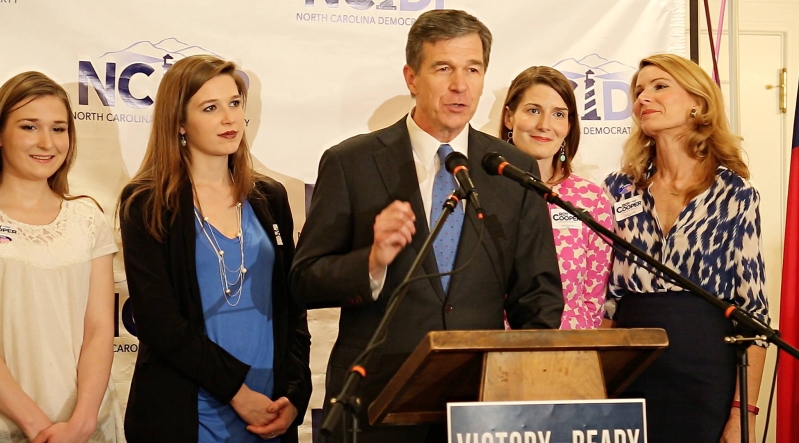
Battle lines now exist between North Carolina and U.S. federal government representatives regarding the state's controversial bathroom law, which has become the epicenter of a larger fight over transgender rights. The N.C. law, HB2, requires people to use public restrooms according to the sex they were assigned at birth, rather than the one with which they currently they "identify." Everyone's suing everyone, except one defector: N.C. Attorney General Roy Cooper, a Democrat who is running for governor.
Cooper said he won't defend the state against the Justice Department's lawsuit because he thinks the new law is discriminatory and "a national embarrassment."
Cooper's opponent, Gov. Pat McCrory (R), is thought to be trying to make Cooper's lack of legal engagement of this topic into a political issue in the two men's hotly contested race. Cooper's not doing his job, McCrory argues. "As the state's attorney, he can't select which laws he will defend and which laws are politically expedient to refuse to defend," he said.
The Washington Post reported two law professors who study this type of law wrote a Los Angeles Times op-ed arguing North Carolina's law does require its top lawyer to "defend all actions in which the state may be a party."
State attorney generals refusing to defend laws, along with resulting political accusations is a worrying trend for democracy, said the professors, Neal Devins at William & Mary and Saikrishna Prakash at the University of Virginia, reports The Washington Post: "More and more state attorney generals are refusing to defend divisive laws, especially those championed by opposition party governors and legislatures. Many seem to have concluded that non-defense of state laws is an option to be exercised in the service of politics."
Even if Cooper is running against N.C. law, it might be within his right to do so, said two other legal experts, according to The Fix talked. He's a state attorney general sworn to uphold both state and federal law, and in this case the federal government said his state's bathroom law isn't legal.
Historically, there have been few times that state attorney generals have been punished for refusing to defend their state's laws.
Most state constitutions have means for disciplining state officials who are derelict in their duties, U.N.C. constitutional law professor Michael Gerhardt told the Washington Post. An example he offered was Alabama's top judge recently got suspended from the bench after a state commission alleged he disregarded the U.S. Supreme Court decision legalizing same-sex marriage.
In this particular set of circumstances, N.C. voters could decide Cooper is not doing his job, and vote against him in the state's close governor's race this November.
Cooper on his own Facebook page Tuesday said he is working to keep jobs in North Carolina while pushing to repeal HB2. He offered the example of drug maker Braeburn Pharma, whose company leaders decided to stay and fight discrimination after meeting with Cooper.
"We seriously considered moving our manufacturing facility to another state to send a clear message about the depth of our commitment," said Braeburn CEO Behshad Sheldon in a statement. "Ultimately, however, we concluded that abandoning Braeburn's job creation plans in Durham County would unfairly penalize a community that shares Braeburn's commitment to equality."
In the company's statement, Sheldon said, "The Attorney General argued that Braeburn could help more by advocating from within North Carolina than by protesting through departure."






